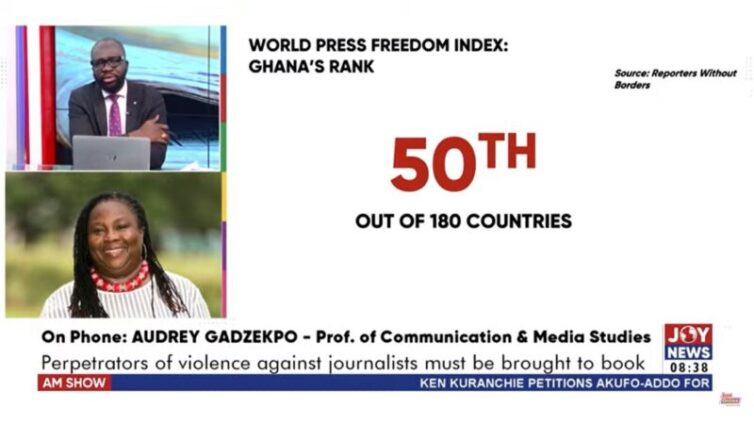Professor Audrey Gadzekpo says the country’s media freedom continues to decline due to the absence of regulations to govern the broadcast sector.
According to her, a broadcast law is urgently needed to address attacks on journalists and media practitioners, following the World Press Freedom's recent Index report, which ranks Ghana in 50th position out of 180 countries.
She said, “There are no regulations in place governing the broadcast space, and we have been talking about this for many years.”
Prof. Gadzekpo added, “The lack of a broadcast law should have been addressed at the beginning, when the airwaves were liberalised.”
She was speaking on Joy News’ AM Show on Monday, November 11, 2024, with Benjamin Akakpo.
She emphasised that there must be consequences for impunity against the media in order to deter such actions. “There have to be sanctions for impunity against media professionals, and stronger sanctions at that.”
According to the Ghana Journalists Association (GJA), a total of 45 cases of attacks on journalists were reported between 2019 and 2023.
The most recent attack involved Joy News' Environmental Journalist, Erastus Asare Donkor, and three of his colleagues, who were attacked in the Ashanti Region while reporting on illegal mining activities in a protected rainforest. The journalists were assaulted by armed illegal miners, who also seized their equipment.
Despite the victims’ efforts to seek justice, the Ghana Police Service has been slow to act on the case.
In an effort to ensure the safety of journalists, the President of the Ghana Independent Broadcasters Association (GIBA), Cecil Sunkwa-Mills, also speaking on the show, said that his organisation has been organising programmes to train journalists. Over 1,000 media practitioners have benefited from these initiatives.
“In the past 24 months, together with several institutions, we have conducted training, capacity building, and media literacy programmes for over 1,000 journalists from media houses across the country. This is to help align ethical practices and also enhance technical skills.”
Ghana currently has a broadcasting bill, introduced in 2014, and over the years, stakeholders in the media sector have called for its passage into law. Government, on the other hand, has promised on several occasions to pass the bill, but this has yet to be done.
Latest Stories
-
Fuel Levy: What crime have Ghanaians committed? – Dr Amin Adam questions gov’t
26 minutes -
Postecoglou sacked by Spurs after Europa League win
1 hour -
Employee fraud is everywhere, be intentional about stopping it – Expert counsels
2 hours -
We have a very good chance of making it to the World Cup – Jordan Ayew
2 hours -
Innovation Hubs as Engines of Sustainability: Charting Ghana’s path with lessons from the Hamburg Sustainability Conference 2025
2 hours -
UHAS makes history with publication of landmark study in Nature Human Behaviour
3 hours -
Asante Gold Corporation commended for community development projects in W/N region
3 hours -
World Environment Day: Stakeholders urge collaborative effort for sustainable ecosystem restoration
3 hours -
Photos: Thousands of Muslims observe Eid al-Adha 2025 at Independence Square
3 hours -
Russia launches ‘massive’ strikes days after Ukrainian drone attack
3 hours -
Ghana, Morocco agree to Visa-free travel for Ghanaians, says Foreign Affairs Minister
3 hours -
Samson Anyenini and OneGhana Movement renew calls for compensation for June 3 victims
4 hours -
California-based VIMA delivers lifesaving borehole to forgotten Ghanaian village
4 hours -
Health Minister calls for independent mediation to end nurses’ strike
4 hours -
Office of the Special Prosecutor remains Ghana’s most promising anti-corruption tool
5 hours

